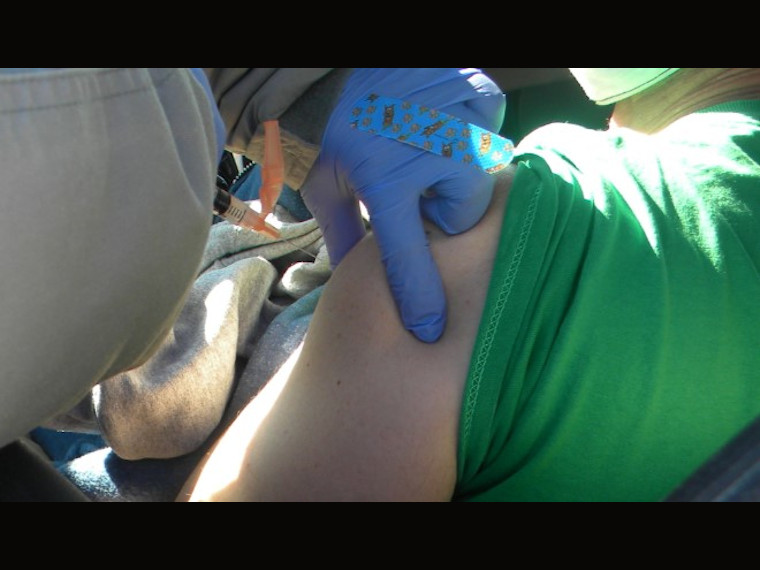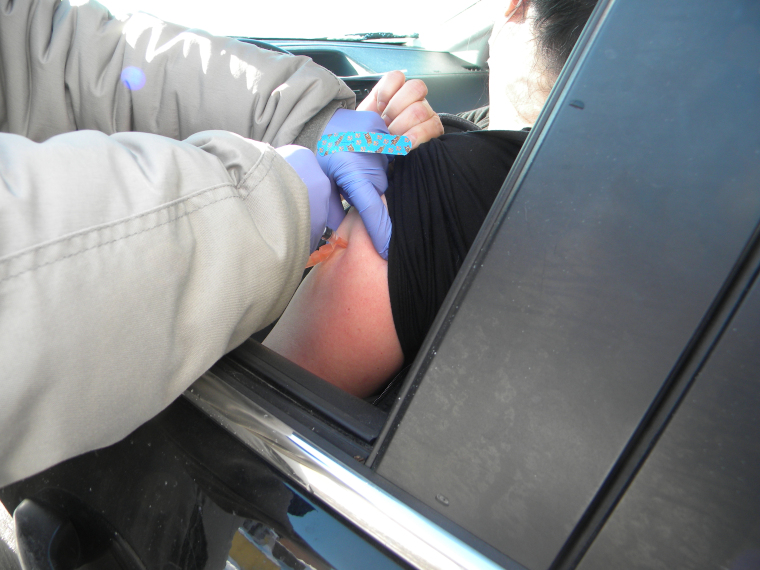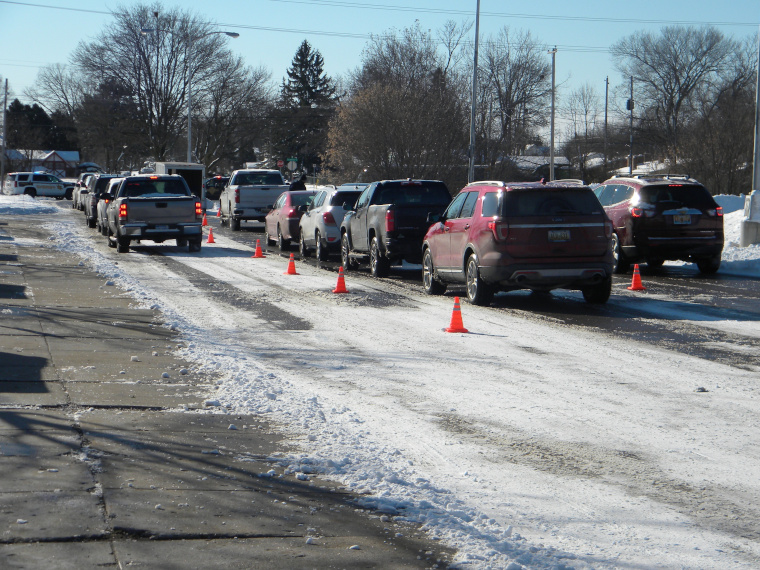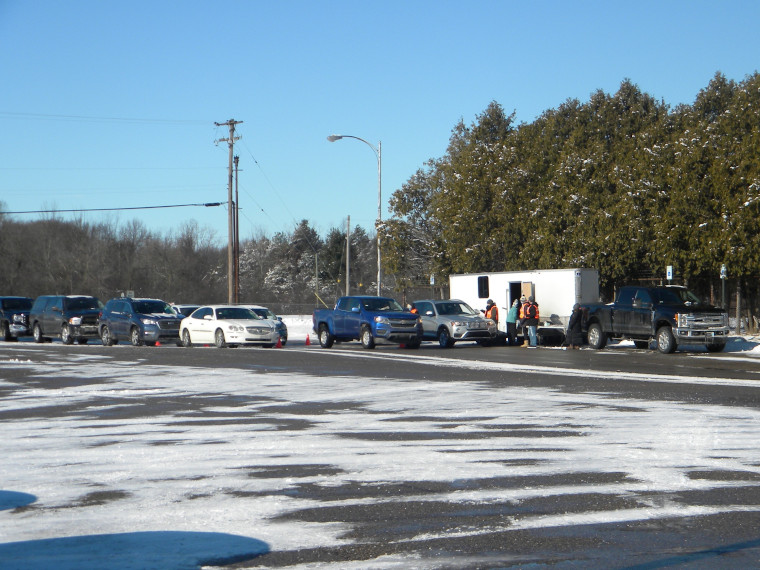Featured photo: Line to check in to get vaccinations at Northwestern High School
Written by Tanya Terry
The number of residents who had been vaccinated was is at least well over 4,000, according to Genesee County Nursing Director Kim VanSlyke-Smith.
“It’s the same all over the state and all over the nation,” VanSlyke-Smith said. “Because this is a new vaccination; it’s a new vaccine-it’s coming out the federal level down from the states and then out from the states out to the local counties. So, there wasn’t a way to have a concrete plan. It’s not that it didn’t go as planned. There just wasn’t a way to have a concrete plan because we didn’t know going into this how many vaccines we would get. We didn’t know how many we would be allowed to order each week to start with. So, it’s really hard to plan how many clinics you can offer and how many appointments you can offer when you don’t know how many doses of vaccine you’re going to actually have until the Friday before the week starts.”
Van-Slyke-Smith said since the county was able to get a plan in place, they have had to continuously adjust the plan based on the number of doses of vaccine they have.
The county health department has many partnerships with minority groups. Concerns from the African American community are addressed in a webinar hosted by Yvonne Lewis every Friday with community information. Representatives from all the minority groups are represented on the webinar, which regularly consists of updates from the state and representatives from the county health department, as well. Lewis, the webinar’s host, is the founder/CEO of the National Center for African American Health Consciousness and outreach director for the Genesee Health Plan.
“Latinx and our deaf community here are big in Genesee County, along with our Muong population (people from the mountainous region of northern Vietnam), as well as a few other populations” Van-Slyke-Smith said. “Then we have our faith-based community as well, and Suzanne Cupal has weekly and monthly meetings with several of those. So, we are in the process of having all of our material translated; everything that comes out new from the CDC.
(Centers for Disease Control & Prevention).”
The Genesee County Health Department is working with a company to translate materials. Registration forms will be translated.
“Once we get an amount of vaccine where we can run big clinics and small, specialty clinics-then we will also be focusing some of the specialty clinics on some of those minority populations.”
These minority groups are able to go to the existing clinic and family members can translate for them, if possible.
The epidemiologist for the Genesee County Health Department is currently working on calculating the numbers of minorities and seniors, as well as other populations. This information will be made available as soon as possible and will also be on the Genesee County Health Department website. The information will also help the county health department to plan specialty clinics. The website has moved from electronic, automated scheduling to a Survey Monkey they can pre-register for that puts them in a database with all their information.
Last week there were two specialty drive-thru clinics for at-risk school teachers; those over 50 or that work with special needs children who can’t wear masks.
Since vaccinations in Genesee County are by appointment only, the wait time in line once residents get their appointments isn’t as long as the wait currently is in other communities in Michigan where wait times can be four hours according to a source. According to VanSlyke-Smith, the entire process of the vaccination appointment takes approximately an hour here. The process at Northwestern High School for the drive thru testing involves a check-in, a comparatively short wait in line to get registered, getting a registration paper, being vaccinated and being monitored for 15-30 minutes after the vaccine is given. At the health department, a check-in is required, residents fill out registration forms and within 10-15 minutes, they are called to a room to be vaccinated and they wait in the lobby 15-30 minutes to be monitored.


For some elders who have mobility issues, getting them in a car is OK but having them get out at a parking lot and walk into a building is requires additional effort. So, the drive thru is easier for them. Because they work on the weekdays, weekend drive thru appointments when offered tend to work well for health care workers who still need to be vaccinated and for teachers.
The health department is working on having two permanent sites in order to have large, weather-resistant tents and do drive-thrus all through the winter. Northwestern will be one of the sites so the health department can be sure to reach the northern Flint area. The other permanent site the health department is looking at is the University of Michigan-Flint’s large lot on the corner of Saginaw and Robert T. Longway, which is centrally located in Flint but easily accessible to the rest of the county.
Currently, all those being vaccinated are either seniors (over 65), school teachers or the 1A group; health care providers and first responders.
The biggest concern the public has is access to the vaccine.
“There’s just not enough to go around yet; so just the volume. We have lot of interest in getting appointments and it just isn’t happening fast enough for them, which I understand. It’s not happening fast enough for us either.”
According to the Centers for Disease Control and Prevention (CDC) website different types of vaccines work in different ways to offer protection, but with all types of vaccines, the body is left with a supply of “memory” T-lymphocytes as well as B-lymphocytes-two types of white blood cells- that will remember how to fight that virus in the future. For example, mRNA vaccines contain material from the virus that causes COVID-19 that gives our cells instructions for how to make a harmless protein that is unique to the virus. After our cells make copies of the protein, they destroy the genetic material from the vaccine. Our bodies recognize that the protein should not be there and build T-lymphocytes and B-lymphocytes that will remember how to fight the virus that causes COVID-19 if we are infected in the future.
According to VanSlyke-Smith, the most common side effects for anyone despite race, ethnicity or background have been mostly mild reactions: swelling and tenderness at the site. A few people have also responded with mild COVID-like or flu-like symptoms; with headaches, low grade fever and body aches being the three most common such symptoms.
According to VanSlyke-Smith, these side effects and symptoms are very common and show the immune system is strong working as it’s supposed to; responding to the mimicking of the virus being exposed to the system.
“That’s the same way it would react if it were the actual virus that was intruding in your body. So, it’s really a good thing when your body responds that way. It’s a positive way for you to know your immune system is working and triggering effectively. Not that if you don’t have symptoms it means your immune system is not working. Everybody’s immune system works a little bit differently. That’s why some people if they get COVID have very mild symptoms and some have very serious symptoms, even if they have the same amount of exposure.”



